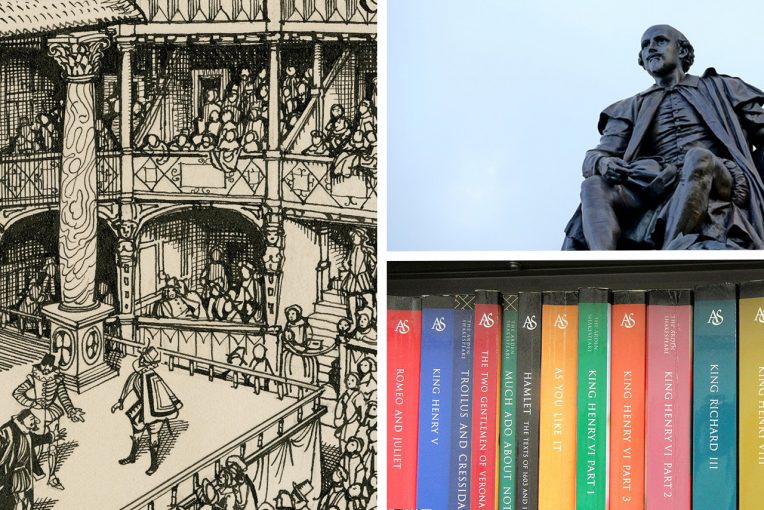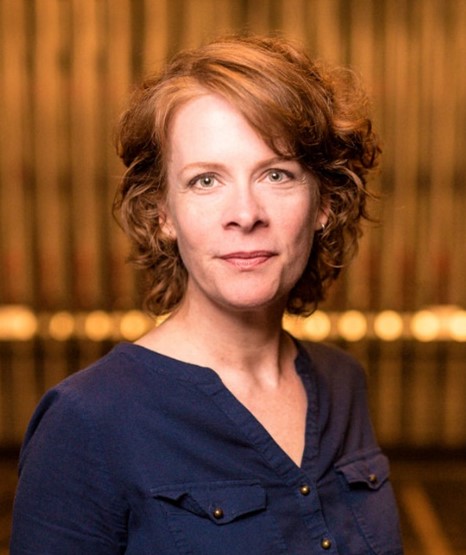Festival Dramaturg Kee-Yoon Nahm spoke with director Jenny McKnight about the upcoming production of William Shakespeare’s Measure for Measure at the Illinois Shakespeare Festival (ISF). This interview has been edited for length and clarity.
Kee-Yoon Nahm (KN): You were originally supposed to direct Measure for Measure last summer, before the season was cancelled because of the coronavirus (COVID-19) pandemic. At the time, I remember you saying that you were less familiar with this play compared to others by Shakespeare, and that you were making a lot of discoveries. Now that you have had an additional year to think about it, how have your views on Measure for Measure changed or developed?
Jenny McKnight (JM): This past year has really given me an opportunity to think about the play from a number of different perspectives. The play resonates for me in a very different way than it did last year. Last year, I had plans to explore the civic dynamics of Shakespeare’s Vienna with a large cast. But that will not be practical this summer. So, how do I think about the play with the limitations that we have? How do we let the limitations inform the world of the play rather than try to pretend that those limitations are not there? I want to use our current situation as a lens to think about what we are saying now with a play like Measure for Measure that is different than what we would have said even just a year ago. In a weird way I am grateful to have had the pause—not really, but maybe in trying to find a silver lining.
KN: What are some of the big themes that you want to explore in the play?
JM: I have been looking at a number of critical responses to the play, and the one that right now is most interesting to me is an essay in Harold C. Goddard’s book The Meaning of Shakespeare, where he explores the ideas of authority and power. I find his views helpful because they feel actable, something that we can actually present onstage as opposed to just a scholarly examination of the text. There is so much language and so many relationships in Measure for Measure that are about power dynamics. The play shows how power and the granting of power often leads to extreme behavior. We see this in our own contemporary world where these political extremes swing back and forth like a pendulum every four or eight years. It is all very reactionary. This is an interesting phenomenon to explore because the title of the play implies balance. When the Duke condemns Angelo’s behavior, he mentions a very punitive idea of justice: “An eye for an eye,” and so on. I am interested in examining this idea of justice versus an idea of balance where the pendulum does not swing from one extreme to the other. Which does the play advocate for?
KN: Would you talk more about Duke Vincentio as a character? He is the one who basically orchestrates the entire plot.
JM: The Duke temporarily hands over his power to Angelo in order to regain control over Vienna. He does this very much with an agenda, which I think is impossible to ignore. I am thinking differently about that now. Last summer, I thought the Duke was winging it as he moved through the play and got his hands dirty in this or that activity. It felt like he was working on the fly to manipulate the outcome. But now, I feel that he has a plan. He is trying to resolve a tension or conflict that is in Vienna, a problem of government. And he chooses Angelo for very specific reasons, one of which I think has to do with Angelo’s personal life. He already knows the backstory about Angelo and Mariana’s past engagement. It is interesting to explore the idea that the Duke wants to expose Angelo and his behavior from the start.
“How do I think about the play with the limitations that we have? How do we let the limitations inform the world of the play rather than try to pretend that those limitations are not there?”

KN: We also learn that the Duke is a ruler who does not like to show himself in public.
JM: Absolutely. The Duke is introverted or unwilling for whatever reason to directly engage with his subjects. That removal from the people he is responsible for governing has created a lot of problems. He actually has to disguise himself as a friar in order to get close and personal with others. This also tells us something about the relationship of the church to the populous since the Duke’s disguise grants him the cover—literally—to gain the people’s trust. They understand his altruistic motivations in a different way than if they saw that it was their ruler. I find it interesting that career politicians are somewhat removed from the people that they represent. How do we reestablish that connection?
KN: Speaking of current politics, the play is also known for capturing something essential about women’s experiences, especially with regard to sexual misconduct. Angelo and Isabella’s lines have especially been quoted a lot these past few years with regard to the #MeToo movement. How will you explore that theme in your production?
JM: Angelo is a clear demonstration of how absolute power corrupts absolutely, not just in a political way but also in an interpersonal way. I find Angelo an interesting character because of his purported lack of experience in matters of love and relationships. He first uses that as a shield in his inappropriate behavior towards Isabella. But when she objects to the horrible bargain that he offers her—sex in exchange for her brother’s life—it becomes a power play for him. He very much turns it into a “he said, she said” matter when he says, “Who will believe thee, Isabel?” Isabella has no agency, no power, because she has no one to complain to.
KN: I do not want to give away too much of the production, but would it be alright to talk about one interesting change you are making to Shakespeare’s play? Escalus, a high-ranking member of the Duke’s court, has been changed into a woman, right? I think your take on this character is another way of looking at the relationship between power and gender in this play. Can you talk about that idea?
JM: What we know in the play is that Escalus is a trusted advisor to the Duke, and someone who keeps up with what has been going on in Vienna. I am interested in the idea of Escalus being played by a woman, and to make Angelo and Escalus equal in status at the beginning of the play, when the Duke assigns Angelo as his deputy while he is away. I want to ask what it means for the Duke to choose Angelo, a man with a questionable past, over Escalus, an official who is held up as a paragon of decency and honor but is a woman. I have also combined Escalus with the Provost because of our smaller company this year. So, Escalus takes on additional duties in this particular version of the play.
KN: I have read a draft of your production script, and I think the combination of Escalus and the Provost makes her an intriguing character. Both the Duke and Angelo are distant from the people they govern in their own ways. On the other hand, we see Escalus interacting a lot with the citizens that Angelo has thrown in jail for various reasons. So, in a way, Escalus models a different kind of government that is more hands on—in tune with the lives and experiences of the people. And although there is not necessarily language in the play that reflects this, I think your Escalus can be more sensitive to the fact that the state’s policing of sexual desire impacts men and women differently. Since you brought it up, I want to ask more about how the limitations we are facing this year are influencing your creative choices. You had originally envisioned a different version of Measure for Measure with a larger cast. I feel that many of the ideas you discussed last year are still present in this new version. But what are some of the changes?
“I would invite the audience to think about why this actor is playing these two characters and how that works in terms of the larger storytelling.”
JM: With the smaller company, there is an opportunity to rethink how characters are paired when one actor plays multiple characters in different scenes. I have found that interesting and fun to imagine.
KN: Is that something you want to encourage the audience to think about when they see the show?
JM: Yes, but it is tricky because we also have characters like the Duke who are in disguise. We want to make it clear that these other characters are not in disguise, even though the same actor played a different role in a previous scene. At the same time, I would invite the audience to think about why this actor is playing these two characters and how that works in terms of the larger storytelling.

KN: I am excited to see what you discover with the actors in rehearsal. As a last question, would you talk about how the pandemic has affected you as a theatre artist and an educator?
JM: As an educator, I have been impressed with the resilience of my students. They are determined to not only persevere and continue creating art, but also to use this as an opportunity to rethink what kind of art they are creating. The current generation of students are just so engaged. They are activists and advocates for one another. This past year, students have been frustrated and sad. They miss seeing each other and being in the classroom. But they have also been incredibly thoughtful and forward thinking, not backing down from what they want to see happen in the future. From an artist’s standpoint, it has been really sad. I have a lot of friends who are really hurting, who have lost their health insurance, who have lost loved ones to COVID-19 or who have gotten sick themselves. And some who are advocating for social justice are being met with resistance from people and agencies they thought would back them up. There is a lot of collective heartbreak. It has been difficult on a number of levels. But artists are resilient. I have to keep saying that and believe in it. Otherwise, it is easy to sink into despair.
KN: I think this past year has been a time of reckoning. It has been an opportunity to recognize some of the things we have taken for granted in the past, but also a time to reflect on best practices and think of ways of doing better.
JM: Yes, absolutely. In the context of Measure for Measure, I think about the importance of recognizing people as individuals rather than part of abstract groups, as well as our individual responsibility in society. I have been doing a whole lot of soul searching about what kind of artist and teacher I am, what I want to pass on to my students.
KN: Thank you. I look forward to the production in the summer.


